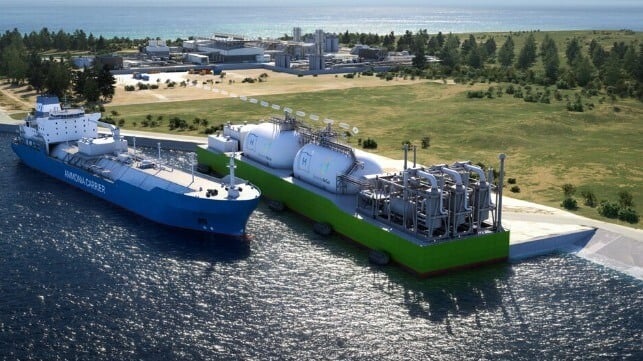Germany's First Floating Hydrogen Terminal to Boost Industrial Decarbonization
Key Ideas
- Deutsche ReGas and Hoegh-LNG partner to develop the world's first floating import terminal for the industrial-scale conversion of green ammonia to green hydrogen by early 2026.
- The innovative cracker technology embedded in the barge will produce around 30,000 tons of hydrogen per year, contributing to Germany's industrial decarbonization efforts.
- The project aims to provide a model for global decarbonization by adapting existing marine infrastructure elements and importing hydrogen from global producers overseas.
- Germany's industrial heartland is targeted as an early user of hydrogen, highlighting the significance of the H2-Import-Terminal Lubmin in transitioning challenging industries to alternative fuels.
Plans for the development of the world's first floating import terminal for hydrogen have been unveiled in Germany as part of a strategic effort to supply the alternative fuel to the country's industrial base. Deutsche ReGas and Hoegh-LNG, known for their role in rapidly developing LNG import terminals in Germany, have joined forces to establish the 'H2-Import-Terminal Lubmin.' This innovative facility will facilitate the conversion of green ammonia to green hydrogen on an industrial scale and is expected to be operational by early 2026.
The project involves the integration of a green ammonia cracker technology into a carrier barge, which will pave the way for the conversion and decarbonization of FSRU's in Germany. By leveraging existing marine infrastructure and importing hydrogen from global producers, the initiative aims to make cost-competitive hydrogen accessible within the next few years.
Deutsche ReGas will oversee the on-shore terminal infrastructure and project coordination, emphasizing the potential of the H2-Import-Terminal Lubmin to drive decarbonization in eastern and southern Germany. The planned annual production of 30,000 tons of hydrogen will be connected to the hydrogen core network, positioning Germany's industrial regions at the forefront of adopting alternative fuels.
This ambitious project not only addresses the pressing need for industrial decarbonization in Germany but also sets a precedent for global efforts towards reducing emissions. With the industrial heartland of Germany earmarked as a key beneficiary, the H2-Import-Terminal Lubmin signifies a crucial step towards transitioning challenging industries to sustainable energy sources, offering a beacon of hope for achieving widespread decarbonization.
Topics
Maritime
Energy Transition
Decarbonization
Infrastructure Development
Global Cooperation
Industrial Innovation
Green Ammonia
Latest News
